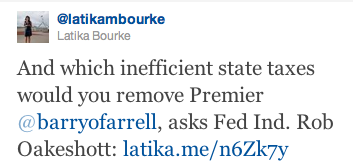 |
| Photo from here |
This was a girl that would find a very happy home with the Republican Party in the US (especially their Tea Party colleagues) - governments should be small, spending should always be the absolute minimum (except of course for defence) and taxes should be cut, cut and then cut again.
This view is far less common in Australia. Whilst the Federal Coalition has shown a new-found enthusiasm for small government of late (no doubt in part due to the happy synergy this has with opposing the Carbon Tax) their efforts on this front are positively lacklustre in comparison.
With that in mind, it is surprising (at least to me) how strident opposition can be to new taxes. I've already mentioned the Carbon Tax, but we need only think back to the GST for an example of how easy it can be to oppose a tax.
As I said on twitter today, it is just too easy for a lazy journalist to find someone worse off under the tax, and publish a double page spread of the family in front of their McMansion weeping over $15 a week.
Every business failure is blamed on the new tax - even those businesses that haven't turned a profit since walkmans were the next big thing.
This is the reason why O'Farrell's suggestion that the GST be increased is probably never going to see the light of day.
The story was brought to my attention by O'Farrell's exchange today with ABC journalist Latika Bourke:
I had a look at Oakeshotte's piece. His Private Member's Bill seems pretty outlandish, and I imagine I'll return to it another time.
I'm more interested in the NSW Government's submission to the Tax Forum, a document I'm ashamed to say I had not read before today. It can be found here, and it worth a gander - it is shortish and written in fairly plain English.
There is a bit of commentary about the imbalance between Federal and State governments when it comes to Revenue and Expenses - in short, the Federal government holds the purse-strings for the states. There is a lot of talk about the Spirit of the Constitution (which, for me, is a short step from discussing "the vibe").
There is also an interesting proposal regarding the treatment of fuel excise - essentially NSW wants her share of the fuel excise sent straight over to be spent on road infrastructure.
It is the proposal on GST that has got people talking today though.
What the paper calls for is this:
Why are they more efficient? These two tables explain why:
To understand those tables, it is essential to grasp the concept of "Excess Burden". Wikipedia says the following:
The average burden is the average at the present rate. The marginal burden is the additional burden for the next $1 - a marginal burden of 10% means that $1 extra of tax will mean $0.1 of burden.
The numbers that we are interested in are the numbers for GST compared to some of the State taxes. The differences are stark, and clearly show the benefit of eliminating these State taxes in favour of more GST.
There are other benefits as well. Eliminating one of those taxes in favour of a higher GST-rate would save huge amounts of money on administration (for government and business).
If the Federal government was really smart what they would do is remove GST's food exemption. With some carefully targeted income tax cuts and/or welfare increases the lowest earners would not be worse off, and we would have a tax system that is simpler, cheaper to administer, less prone to fluctuations and, above all fairer.
Will it happen? Of course not.
Even for a popular government, an increase in the GST-rate is politically disastrous. We all remember how hard it was for Howard to convince us the GST was a good idea (and even then it probably hurt him at the 1998 election). For the present Federal government? Fuggeddaboudit.
Moreover, where is the benefit for a Federal Government? The State Governments will score big as some hugely unpopular taxes are eliminated (I'm thinking especially of land tax or payroll tax) but the Federal government will be the big bad guy.
How do I know? Read this awful piece on the NSW Labor website.
The writing in this piece (especially the quotes) is so awful I want to poke my eyes out, but I can also acknowledge that it is effective. The image of Barry's hand in your pocket - it's awful, horrible writing, but even this piece would do the job. Imagine a slick, well crafted, intelligent campaign. It could actually make the next NSW election competitive.
O'Farrell's proposal isn't going to happen. What is more likely is that the GST issue is a feint to win a share of income somewhere else so that the Coalition has the funding room to reduce payroll tax a little more.
Another good idea that will never see daylight. A shame - but certainly not a surprise.








No comments:
Post a Comment